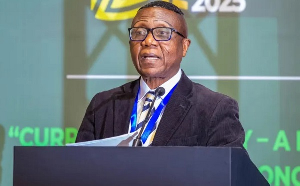With a royalty payment of 12.5% based on gross production, corporate tax on profits of 35%, and participation interest of 15%, one can conveniently say that Ghana has struck a good deal for her oil find. It is, therefore, not surprising that the country has raked in a whopping $5 billion ever since production started in 2010.
On the surface though, one may argue that the 35% corporate tax is the highest, but in reality, the royalties and participating interests of the Ghana National Petroleum Corporation (GNPC) rake in more revenue, because they are chargeable on gross production of the commodity, whilst the corporate tax is collected on profits.
But, despite this remarkable achievement, the Public Interest and Accountability Committee (PIAC), which is a creation under section 51 of Act 815 of the Petroleum Revenue Management Act, says all it not ye Uhuru, and that there are thorny issues that must be addressed.
These thorny issues, according to Dr Steve Manteaw, the no-nonsense Chairman of PIAC, range from the management of the Annual Budget Funding Amount (ABFA), Ghana National Petroleum Corporation’s share of the revenue, and other statutory bodies. Zeroing in on the ABFA, Manteaw said at a forum organised for editors at Senchi in the Eastern Region over the weekend, that a percentage of the oil revenue goes into the funding of the annual budget.
He contended that in 2017, out of the total oil money transferred to ABFA, $403 million was not untilised. In 2018, another $252 million out of the total figure transferred to the fund (ABFA) was not utilised. If these funds, amounting to $655 million, were not utilised, then where is the money, the editors asked? Dr Mantew responded that according to the Ministry of Finance, the money had been lodged into Treasury Accounts, but there are no documentation to prove this claim.
To him, any unspent oil money in the ABFA account should be sent back to the Petroleum Holding Fund (PFH) to ensure proper accountability of our oil revenues. But the Ministry of Finance, which has always argued that the unspent money is not lost, thinks otherwise. The Ministry contends that, per Public Financial Management Act, 2016, they are not allowed to transfer the unspent funds back to where it came from, and, in this case, the Petroleum Holding Funds.
This is the reason why the Ministry claims the money has been deposited in the Treasury Account, which PIAC is disputing because there are no documentations to authenticate this claim. To Dr Steve Manteaw, if this unspent money, amounting to a whopping $655 million, has indeed been deposited into the Treasury Account, as claimed by the Ministry, then there would be no need for Ghana to go to the international capital market to borrow money to support the budget.
Since the Petroleum Management Act and the Public Financial Management Act, 2016 are saying different things, with the Ministry of Finance choosing provisions in the latter over the former, Dr Mantew and his PIAC team contend that the only solution to the problem is the amendment of these laws to state that unspent oil money should be sent back to the Petroleum Holding Funds for proper tracking and accountability.
PIAC, however, admitted that the Ministry of Finance had agreed to meet them quarterly to discuss the unspent money brouhaha.
Turning his guns on the GNPC, Manteaw eloquently argued that until the state-owned corporation is weaned off from governmental control, it can never stand on its own feet, as was envisaged. According to PIAC, during the immediate past National Democratic Congress (NDC) regime, $50 million was withheld from the GNPC, and described in officials documents as a borrowed fund. Despite being treated as loan, though it has no documentation to support it, the government is now forcing the state company to write it off.
Manteaw told the editors that looking at the quantum of oil money GNPC is receiving, the state-owned oil company should be able to stand on its own, but political interference over the years would not allow this to happen. He does not, for instance, understand why the Corporation cannot answer cash calls whenever they are made, looking at the GNPC’s huge revenue stream. Cash calls are requests for payment for anticipated future capital and operating expenditures sent by joint venture operators to non-operating partners.
But, despite raising issues with the cash calls, the PIAC Chairman would not condemn it intoto. Under normal circumstances, whenever the cash calls are made, GNPC should raise the funds from either its own sources or the capital market, and give them to the partners in our oilfields, but they (GNPC) always asks the partners to pay the money on their behalf. The partners will then lift the crude when it gets to GNPC’s turn to offset the money the raised for the cash calls.
According to Manteaw, GNPC has taken this decision because interest on the money raised by the partners on its behalf during cash calls hovers around one percent, whilst borrowing from the capital market to answer the cash calls would attract interest of 10%. To the corporation and the government, therefore, it makes economic sense to ask the partners to answer the cash calls on their behalf.
“This, to me, makes economic sense, but again, the big question is – where is the money GNPC has been receiving as equity share holders in the oilfields?” he asked. PIAC does not also understand why GNPC should foot Ghana’s bill of $3.8 million for the sea boundary dispute she had with Ivory Coast. PIAC is arguing that since the dispute was between two countries and not companies, the $3.8 million should be returned to the chest of the GNPC.
Dr Steve Manteaw also raised concerns with the overall management of the oil revenues. According to him, the law states that 70% of the revenue should go into capital expenditure. Regrettably, he said, the chunk of the money is rather going into consumption. He contended that if the current trend is not truncated, our oil reserves would get depleted whilst the country would have nothing to show for the discovery.
According to him, he is not against the Free Senior High School (SHS) policy being implemented by the government, but disagrees with the use of oil money to fund the policy, which is considered consumption, and, therefore, against the dictates of the Petroleum Management Act.
The Ministry of Education has umpteen times rejected this criticism, contending that the use of the oil money to sponsor the free SHS is an investment they are making in future leaders of the country, and cannot, therefore, be described as consumption.
But, to Dr Steve Manteaw, granted that this argument has sound footing, it is still dangerous to be relying on oil money to fund the programme because of the volatility of the oil business. He could not figure out how the government would deal with the situation by way of raising funds for the free SHS, should oil prices plummet for a long period on the international market.
On behalf of PIAC, Dr Steve Manteaw, however, lauded the GNPC for judicious use of the oil money to fund the construction of schools in the country. He said materials and the entire structures are of high quality as compared to those being constructed by the government itself, which are of inferior quality.
General News of Wednesday, 28 August 2019
Source: thechronicle.com.gh













